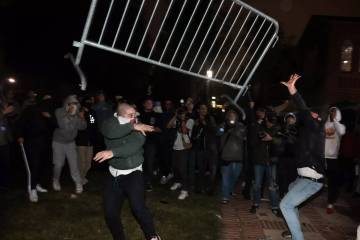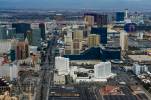Hurricane Matthew roars ashore in Haiti; eastern US braces for storm
PORT-AU-PRINCE, Haiti — South Carolina’s governor said she would issue an evacuation order Wednesday so that 1 million people would have time to leave the coast ahead of Hurricane Matthew, and residents up and down the Eastern seaboard entered better-safe-than-sorry mode, flocking to hardware stores, grocery aisles and gas stations to prepare for the powerful storm.
Matthew was on track to rake Florida before spinning up the East Coast. The Category 4 storm packing winds of 145 mph pummeled parts of Haiti and the Dominican Republic on Tuesday and is expected to head north over Cuba and the Bahamas before nearing the Florida coast by Thursday. At least nine people in the Caribbean have died.
The National Hurricane Center in Miami issued a hurricane watch for a 260-mile stretch from Golden Beach near Fort Lauderdale to the Daytona Beach area, meaning hurricane force winds of 74 mph or higher could occur within two days.
In South Florida, lines at grocery stores were heavier than usual and some essentials were in short supply. When Simone Corrado and her husband tried to buy water at their Publix in Davie near Fort Lauderdale, they mostly found empty shelves. There were a few bottles of high-end water brands, but there was so much empty shelf space that Corrado lay down and fully stretched out on the bottom shelf.
“I got scared because all that was left at Publix was just the pricey water,” said Corrado, who lived through 1992’s catastrophic Hurricane Andrew, which practically leveled the nearby city of Homestead. “They really put the fear into you here. On the television screen every few minutes is the ‘beep, beep, beep’ storm alert.”
Hurricane Matthew pounded the southwestern coast of Haiti on Tuesday, threatening a largely rural corner of the impoverished country with devastating storm conditions as it headed north toward Cuba and the eastern coast of Florida.
Rain from the dangerous Category 4 storm fell across Haiti before dawn as the center of the storm moved directly across the tip of the southern peninsula, where many people live along the coast in shacks of wood and corrugated steel that stand little chance of withstanding the force of the system’s maximum sustained winds of 145 mph.
“They are getting everything a major hurricane can throw at them,” said Dennis Feltgen, a meteorologist and spokesman for the U.S. National Hurricane Center in Miami.
Gov. Rick Scott, speaking in the Daytona area, warned residents they must be prepared to take a direct hit and evacuation orders could be issued as early as Tuesday. Scott said his biggest worry is that residents won’t take seriously the threat from Matthew, especially since so many newer residents have never lived through a hurricane.
“Don’t take a chance. Leave before it’s too late,” he said. “We have to be prepared to be hit by a catastrophic hurricane.”
Hurricane Hermine became the first to strike Florida since Wilma in 2005 when it hit the eastern Panhandle on Sept. 2 as a Category 1 storm, causing one death, storm surge damage to beachfront homes and downed trees and powerlines. That 11-year lull between storms hitting Florida was the longest on record.
The last storm to hit the Atlantic side of Florida was Hurricane Katrina, which struck in 2005 on its way to devastating the Gulf coast.
Wilma made landfall as a Category 3 storm with 120 mph winds, killing five people as it pushed from southwest Florida, through the Everglades and into the Fort Lauderdale and Palm Beach area, causing an estimated $21 billion in damage and leaving thousands of residents without power for more than a week. It concluded a two-year span when a record eight hurricanes hit the state.
Governors in Florida, Georgia, South Carolina and North Carolina declared states of emergency. President Barack Obama canceled campaign and health care events in Florida on Wednesday and would instead visit the headquarters of the Federal Emergency Management Agency.
Some airlines let passengers change travel plans without penalty if their trip might be affected by Matthew.
Near Fort Lauderdale, The Home Depot in Davie briefly ran out of propane for gas barbecues and the supply of batteries was dwindling. People bought plywood to cover windows, tarps to put over outdoor furniture and coolers for food storage.
Dane Vaala, a diesel mechanic, was loading plywood onto his pickup. He needed it so he could stand on his awning to install upper floor shutters at his home. He moved to Florida from Montana in 2007, so Matthew would be his first storm. He had loaded up on canned food and water.
“I’m not too concerned — it doesn’t really bother me much,” he said. “But it is better to prep.”
Haley said state officials would reverse lanes on major evacuation routes in South Carolina. It would be the first major evacuation since Hurricane Floyd in 1999, when the governor at the time didn’t reverse the lanes and Interstate 26 became a parking lot. A typically two-hour drive from Charleston to Columbia turned into 24-hour nightmare.
“We’ve been though winter storms. We’ve been through a 1,000-year flood. A hurricane is different. I don’t want anyone to look at the last couple of tragedies we’ve gone through and think this is similar,” Haley said.
Haiti’s civil protection agency reported one death, a fisherman who drowned in rough water churned up by the storm. That raised Matthew’s death toll to at least three. One man died in Colombia and a teen was killed in St. Vincent and the Grenadines as the storm moved through the Caribbean.
Cuba’s government declared a hurricane alert for six eastern provinces and workers removed traffic lights from poles in the city of Santiago to keep them from falling when the storm hit.
At one point a Category 5 storm, and the region’s strongest hurricane since Felix in 2007, Matthew was expected to make landfall in Cuba about 50 miles (80 kilometers) east of the U.S. Navy base at Guantanamo Bay, where authorities flew out about 700 spouses and children of service members.
































